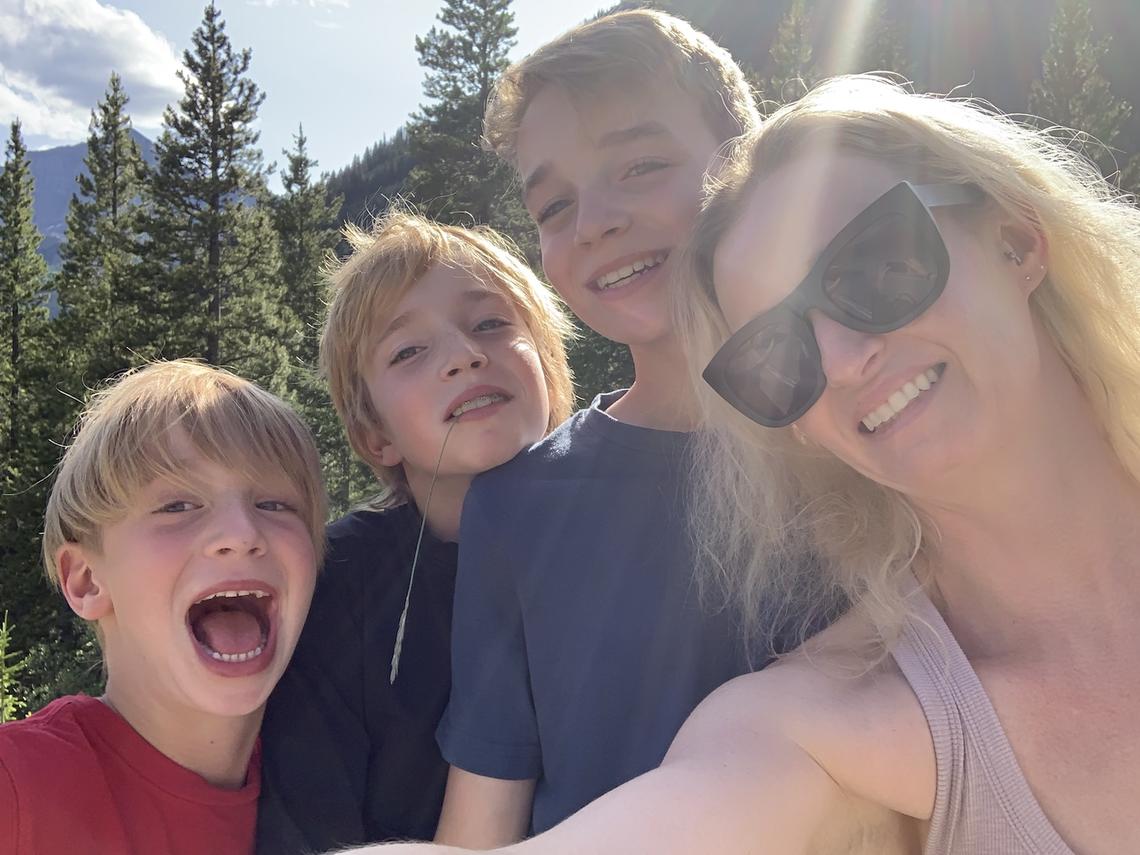April 23, 2020
New nurse volunteers to support health-care practitioner during COVID pandemic
When Renae Polan first entered into the Faculty of Nursing’s Bachelor of Nursing program in 2016, the last thing she thought she’d be going through at the end of four years was graduating in the middle of a pandemic.
Polan, like many of her classmates in the Class of 2020, was in the middle of her preceptorship, completing her final clinical hours for her nursing degree, when COVID-19 hit. In Polan’s case, she was working as a student nurse on the postpartum unit at the Rockyview General Hospital in Calgary.
- Photo above: Polan, right, with classmate Samiha Amin, taken during Term 6, April 2019.
“Postpartum nursing is something I could see myself calling a career,” she says. “It is an area of nursing where all the personal and professional values that create the foundation of my unique practice are present and in perfect harmony.
“When COVID-19 had just started to brew and wasn’t considered a threat or pending pandemic by anyone, I was still attending my clinical hours as normal. Nobody — not me, my preceptors, my friends from school, faculty, staff — nobody could have predicted how this would all change in the coming weeks and months.”
Overnight, Polan went from carefully planning to wrap up her clinical hours the first week of April to abruptly having to finish her last shift on March 15.
“I said my goodbyes way earlier than I wanted to, only a week after my midterm. It felt like my phone was getting notifications non-stop. Messages to and from my preceptors, friends asking for the inside scoop on what it is like to be in the hospitals now and asking if I am doing okay, emails from faculty advisors and course co-ordinators about the latest changes and how COVID-19 is going to impact us as students. Update after update after update.
“It was overwhelming for everyone involved, even with the relentless efforts of faculty to provide us with concise and prompt updates, emphasizing their ongoing support for us and commitment to transparent sharing of information.”
At that point in March, Polan had already met the 300 clinical hours mandated for degree completion. She came across a notice from the Undergraduate Nursing Society on D2L sharing a volunteer opportunity to relieve frontline health-care workers who needed support as they worked during COVID responses and immediately signed up. This was the same volunteer effort organized by UCalgary medical students who matched health-care practitioners with health-care student volunteers in either medicine or nursing.
“I know of students rushing to write NCLEX but I didn’t have that urge to get out on the frontline right away. I wasn’t ready to be done.”
Polan was eventually matched with Kathryn Kurylo, BN’2003, a post-anesthesia care unit (PACU) nurse who works in the recovery room at the Foothills Hospital. As a full-time nurse, Kurylo needed immediate help with home-schooling for her three young boys, ages 12, 10 and seven. On top of mounting changes in her professional life due to the COVID crisis, Kurylo was also on the tail end of a divorce and juggling a move into a new house.

Kathryn Kurylo with her three boys, from left, Micah, Jasper and Jonah.
Courtesy Kathryn Kurylo
“I was super stressed and my friend who worked at the Lougheed got this email about med students helping health-care workers and forwarded it to me,” she says. “I am so thankful that we have had Renae. I feel very lucky to have been paired up with her.”
Polan currently helps Kurylo’s three boys daily with schoolwork. Her responsibilities have ranged from assisting with navigating their Google Classrooms and managing their daily schedules to keeping them active and engaged with physical activities on breaks.
“I’ve definitely drawn a lot from what I’ve learned in nursing school,” says Polan when she talks about the experience. “Setting boundaries with patients, being transparent and honest about what I’m telling you to do and why and having a rationale behind it, that’s evidence-based practice.
“Nurses look at health holistically, it’s not just one thing or another. I’m not looking at their school only, but their family life and how one brother is different from the other, what are their learning challenges, how can I get them to be more independent, and so on.”
Polan says it’s all about going that extra mile to give individualized care. “That’s what I value in my own nursing practice and it’s important for these kids too.”
UCalgary resources on COVID-19
- For the most up-to-date information about the University of Calgary's response to the spread of COVID-19, visit the UCalgary COVID-19 Response website.
- For resources to support students, faculty, staff, alumni, and all our communities during this unprecedented time, visit the UCalgary COVID-19 Community Support website.
- Go to the Campus Community Needs Assessment page if you need assistance with basic needs, or physical or mental health supports.
- Register with the COVID-19 Volunteer Support page if you are a UCalgary staff, faculty, student or alum who has the volunteer capacity to help; we will match you with a member of our community in need.










